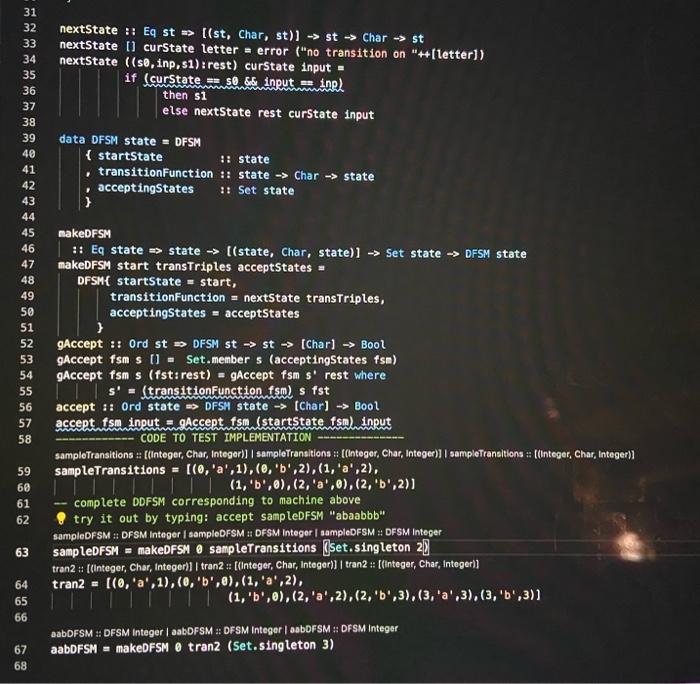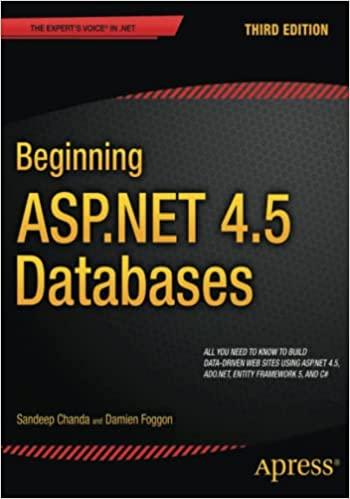Question
The constructor for an FSM requires the programmer to specify the starting state, the set of transitions, and a set of accepting states. The transitions
The constructor for an FSM requires the programmer to specify the starting state, the set of transitions, and a set of accepting states. The transitions are represented by triple of the form (s, i, t), which is interpreted as if the machine is in state s with i as the next input, then it should transition to state t. To run the simulator on a machine M with input inp, one invokes the accept function with the encoding of machine M and inp as parameters. Please write the encoding of a DFSM called eAoB that accepts all strings that contain an even number of as or an odd number of bs
your program file start with comments and the following: module Submission where
import DFSM import
Data.Set (Set)
import qualified Data.Set as Set
You will need the imports of Set to use functions like Set.singleton.
module DFSM where
import Data.Set (Set) -- imports Set constructor for type
import qualified Data.Set as Set
{-implementation of arbitrary deterministic FSM.
For simplicity, all states are just integers. This
implementation is more complex than the simple example because the transition function is not hard coded into the program. I.e. the new program can simulate any FSM. Now when we make a transition, we must not just return the new state, but also carry along the transition function and the accepting states. -}
Main program can be run by typing
accept myDFSM inputString
where myDFSM is a description of a deterministic FSM and inputString is the input. The result is a boolean reflecting whether inputString is accepted or not.
{- nextState converts a collection of triples into a transition
function that determines next state from current state and input
Each triple is of the form (s,a,t) where there is transition from s to t on input a. Thus
nextState trans currentState input
returns the state the machine will be in using the transition
function trans after reading input starting from currentState
-}
nextState :: Eq st => [(st, Char, st)] -> st -> Char -> st
-- if no triple applies then throw exception
nextState [] curState letter = error ("no transition on "++[letter])
-- if find matching triple with curState and input, return associated
-- new state from the triple, otherwise keep looking
nextState ((s0,inp,s1):rest) curState input =
if (curState == s0 && input == inp)
then s1
else nextState rest curState input
{- A finite state machine consists of the start state,
the transition function, and the set of accepting states.
-}
data DFSM state = DFSM
{ startState :: state
, transitionFunction :: state -> Char -> state
, acceptingStates :: Set state
}
makeDFSM
:: Eq state => state -> [(state, Char, state)] -> Set state -> DFSM state
makeDFSM start transTriples acceptStates =
DFSM{ startState = start,
transitionFunction = nextState transTriples,
acceptingStates = acceptStates
}
{- gaccept fsm state input returns true iff the fsmm starting in state
goes into an accepting state in fsm.acceptingStates
after reading in all input.
-}
gAccept :: Ord st => DFSM st -> st -> [Char] -> Bool
-- if no input left, see if state in accepting state of fsm
gAccept fsm s [] = Set.member s (acceptingStates fsm)
-- to process next input, find new state from input,
-- and then run fsm on rest of input
gAccept fsm s (fst:rest) = gAccept fsm s' rest where
s' = (transitionFunction fsm) s fst
-- main function to determine if string accepted by fsm.
-- It differs from gAccept in that it automatically starts in official start state of fsm.
accept :: Ord state => DFSM state -> [Char] -> Bool
accept fsm input = gAccept fsm (startState fsm) input
------------ CODE TO TEST IMPLEMENTATION --------------
-- sample transition function corresponding to same machine used
-- in SimpleExampleDFSM.hs earlier
sampleTransitions = [(0,'a',1),(0,'b',2),(1,'a',2),
(1,'b',0),(2,'a',0),(2,'b',2)]
-- complete DDFSM corresponding to machine above
-- try it out by typing: accept sampleDFSM "abaabbb"
sampleDFSM = makeDFSM 0 sampleTransitions (Set.singleton 2)
-- Transition function for DDFSM accepting strings containing aab.
tran2 = [(0,'a',1),(0,'b',0),(1,'a',2),
(1,'b',0),(2,'a',2),(2,'b',3),(3,'a',3),(3,'b',3)]
aabDFSM = makeDFSM 0 tran2 (Set.singleton 3)

Step by Step Solution
There are 3 Steps involved in it
Step: 1

Get Instant Access to Expert-Tailored Solutions
See step-by-step solutions with expert insights and AI powered tools for academic success
Step: 2

Step: 3

Ace Your Homework with AI
Get the answers you need in no time with our AI-driven, step-by-step assistance
Get Started


